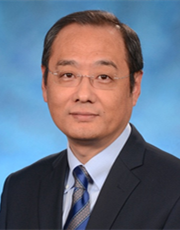

陆五元
职 称:教授
电 话:021-54237607
电子邮箱:luwuyuan@fudan.edu.cn
办公地点:上海市徐汇区东安路131号
教育经历
工作经历
获得人才项目
获得奖项
研究方向
科研项目
课程讲授
学术兼职
代表性论著
代表性专利
1980.09—1984.07 南京大学化学系分析化学专业,本科生
1987.09—1989.12 南京大学生物化学系生物化学专业,研究生
1992.02—1994.12 美国普渡大学化学系生物化学专业,研究生
1984.07—1987.08 中国医学科学院南京皮肤病研究所,助理研究员
1990.02—1992.01 普渡大学化学系,研究助理
1995.07—1996.12 斯克利普斯研究所细胞生物学系,博士后
1997.01—1998.06 格里芬科学公司,资深科学家兼蛋白质化学部主任
1998.07—2000.06 芝加哥大学生物化学与分子生物学系,(研究)助理教授
2000.07—2007.06 马里兰大学生物技术学院,助理教授、副教授(终身)
2007.07—2009.06 马里兰大学医学院生物化学与分子生物学系,副教授(终身)
2009.07—2020.06 马里兰大学医学院生物化学与分子生物学系,正教授(终身)
马里兰大学医学院人类病毒学研究所,研究员
马里兰大学医学院格林鲍姆癌症中心,研究员
2012.01—2017.01 西安交通大学特聘教授
2012.01—2015.04 西安交通大学前沿科学技术研究院转化医学研究中心,主任
2013.06—2015.03 西安交通大学生命与技术学院学院,副院长
2014.07—2020.06 马里兰大学医学院人类病毒学研究所基础科学部,主任
2018.07—2020.06 马里兰大学医学院人类病毒学研究所,副所长
2020.08—至今 复旦大学基础医学院病原生物学系,特聘教授
2012,国家重点联系专家
1992,美国蛋白质学会Ely Lilly Travel Award
1993, 普渡大学Ismail Interdisciplinary Doctoral Research Award
2007,奥本大学Special Lecturer Award
2007,美国癌症学会Research Scholar Award
2014,中国药学会科学技术奖二等奖(排名第二)
抗微生物多肽—防御素的结构、功能及分子机理
抗肿瘤、抗感染药物发现
病原菌感染、致病机制
蛋白质全化学合成及翻译后修饰
2012,国家自然科学基金委海外及港澳学者合作研究基金项目,“抗癌D型多肽的结构优化及其肿瘤细胞内递送研究”
2021,国家自然科学基金委重点项目,“防御素促进志贺菌感染的结构基础及药物发现”
本科生课程:医学科学的前沿创新和实践
研究生课程:现代医学微生物学(二)
2015,国际抗微生物多肽Gordon Research Conference,副主席
2017,国际抗微生物多肽Gordon Research Conference,主席
Wu, Z., et al., Engineering disulfide bridges to dissect antimicrobial and chemotactic activities of human beta-defensin 3. Proc Natl Acad Sci U S A, 2003. 100(15):8880-5.
Wu, Z., R. Powell, and W. Lu, Productive folding of human neutrophil alpha-defensins in vitro without the pro-peptide. J Am Chem Soc, 2003. 125(9):2402-3.
Wu, Z., et al., Total chemical synthesis of N-myristoylated HIV-1 matrix protein p17: structural and mechanistic implications of p17 myristoylation. Proc Natl Acad Sci U S A, 2004. 101(32):11587-92.
Pazgier, M., et al., Structural basis for high-affinity peptide inhibition of p53 interactions with MDM2 and MDMX. Proc Natl Acad Sci U S A, 2009. 106(12):4665-70.
Liu, M., et al., D-peptide inhibitors of the p53-MDM2 interaction for targeted molecular therapy of malignant neoplasms. Proc Natl Acad Sci U S A, 2010. 107(32):14321-6.
Liu, M., et al., A left-handed solution to peptide inhibition of the p53-MDM2 interaction. Angew Chem Int Ed Engl, 2010. 49(21):3649-52.
Chu, H., et al., Human alpha-defensin 6 promotes mucosal innate immunity through self-assembled peptide nanonets. Science, 2012. 337(6093):477-81.
Xu, D., et al., Human enteric alpha-defensin 5 promotes Shigella infection by enhancing bacterial adhesion and invasion. Immunity, 2018. 48(6):1233-1244 e6.
Feng, C., et al., Tanshinones: first-in-class inhibitors of the biogenesis of the type 3 secretion system needle of Pseudomonas aeruginosa for antibiotic therapy. ACS Cent Sci, 2019. 5(7):1278-1288.
Li, X., et al., Design of ultrahigh-affinity and dual-specificity peptide antagonists of MDM2 and MDMX for p53 activation and tumor suppression. Acta Pharmaceutica Sinica B, 2021. 11(9):2655-2669.
美国专利号8343760,“p53 activator peptides“(2012年授权)
美国专利号10561712,“Treatment of cancer and inhibition of metastasis using hemoglobin beta subunit”(2020年授权)
国际专利申请号PCT/US2019/059500,“Inhibition of type 3 secretion system and antibiotic therapy“
国际专利申请号PCT/US2020/021407,“Tetrameric protein scaffolds as nanocarriers of therapeutic peptides for treating cancer and other diseases“
国际专利申请号PCT/US2021/059160,“Human defensins as inhibitors of SARS-CoV2 infection and uses thereof“





